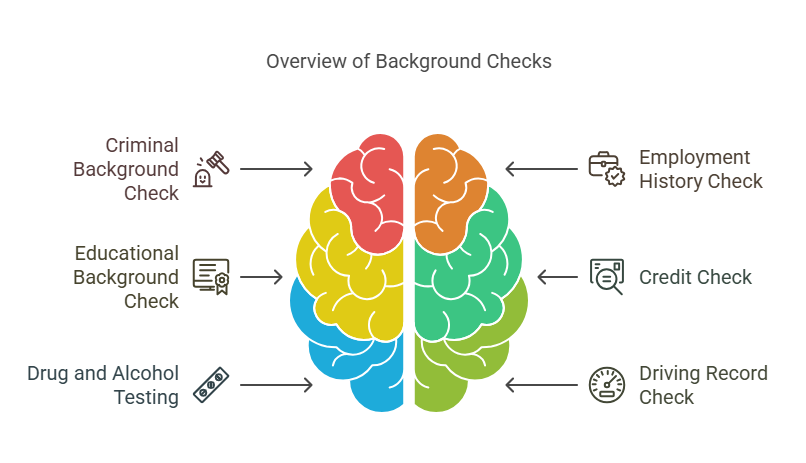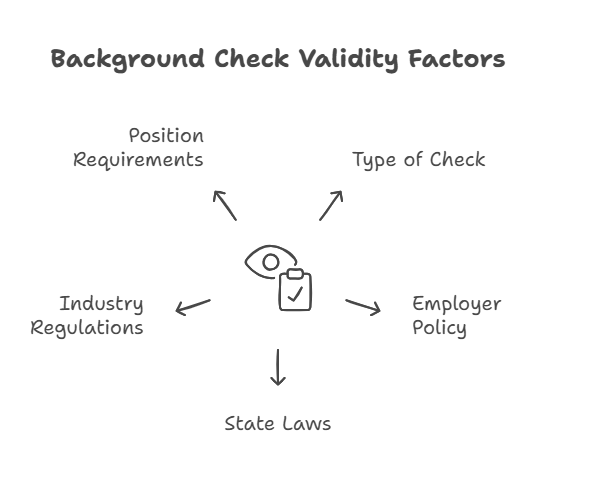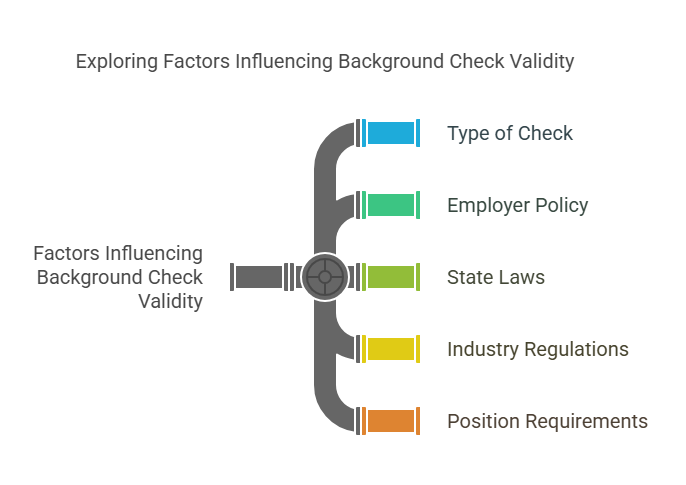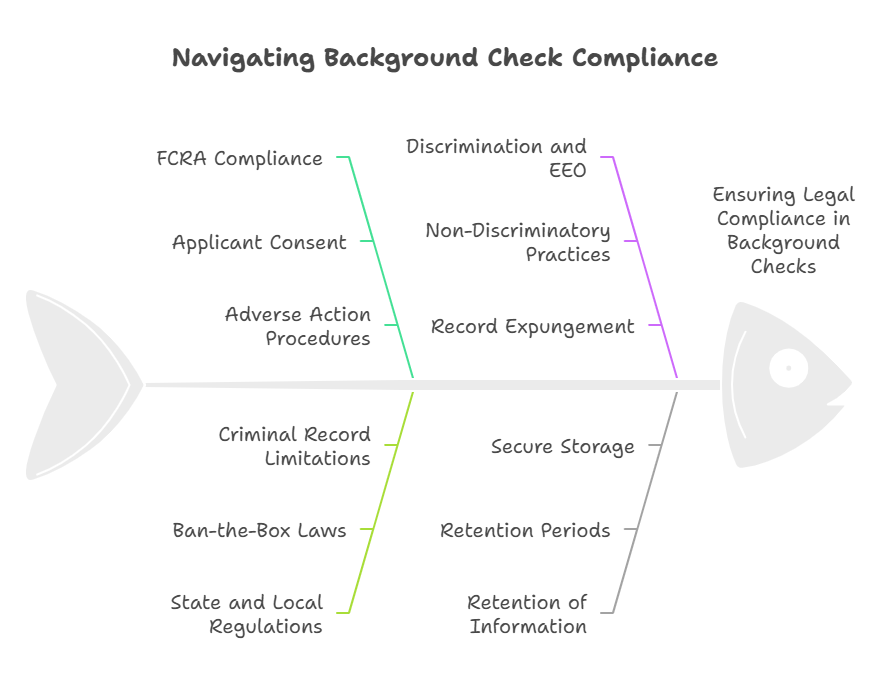How to Determine the Validity Period of Background Checks

What is a Background Check?
A background check is a process used by employers, landlords, and other entities to verify information about a person’s history. The purpose of a background check is to gather pertinent details about an individual’s past, which can help assess their eligibility for employment, housing, or other responsibilities.
Background checks serve various functions, including:
- Verifying identity
- Confirming employment history
- Checking criminal records
- Assessing creditworthiness
- Confirming educational qualifications
- Reviewing driving history
There are several types of background checks, and the specific one conducted will depend on the context. These include:

- Criminal Background Check: Checks for any past criminal convictions, arrests, or ongoing cases.
- Employment History Check: Verifies the details of past jobs, including roles, dates, and reasons for leaving.
- Educational Background Check: Confirms the credentials claimed by the individual, including degrees and certifications.
- Credit Check: Assesses an individual’s financial history and behavior.
- Drug and Alcohol Testing: Evaluates whether an individual has a history of substance abuse.
- Driving Record Check: Reviews the person’s driving history, including traffic violations, accidents, and suspensions.
Each of these checks serves a unique purpose in providing insights into a person’s history and suitability for a position or responsibility.
Why Do Employers Use Background Checks?
Employers use background checks to ensure that candidates are who they claim to be, to verify that they meet job qualifications, and to protect their organizations from risks. Background checks can help employers identify potential red flags in a candidate’s past, such as:
- Criminal history: Ensuring that candidates do not have a history of offenses that would disqualify them for the job.
- Misrepresentation: Preventing fraudulent claims about education or employment history.
- Financial instability: Identifying candidates who might have a history of financial difficulties, which can be important for jobs that handle money or sensitive financial data.
- Driving record: Verifying that candidates applying for driving positions have a clean driving record.
Employers also rely on background checks to maintain a safe and secure workplace, ensure legal compliance, and reduce liability risks.
Factors That Influence the Duration of a Background Check’s Validity

Several factors influence how long a background check remains valid:
- Type of Check: Different checks have different validity periods. For example, criminal records may stay on file for years, while employment verification is typically only valid for the period during which the candidate worked at an organization.
- Employer Policy: Employers may set their own validity period based on internal needs. For example, some may require re-verification of a background check every year, while others may accept a background check for up to five years.
- State Laws: Each state has its own rules regarding how long background check results can be considered valid. For example, certain criminal records may only be reportable for a specific time frame (e.g., 7 years for misdemeanors in many states).
- Industry Regulations: Specific industries may require more frequent or updated checks. For example, healthcare workers, financial professionals, and government contractors may be subject to periodic rechecks.
- Position Requirements: For certain high-risk positions, such as those requiring security clearance or jobs that involve working with vulnerable populations, the validity period of background checks may be shorter, requiring frequent updates.
How Long is a Background Check Typically Good For?
The validity of a background check depends on the type of information being verified:
- Criminal Background Checks: Generally, a criminal record stays valid for as long as it exists in public records. Some employers may recheck records annually, while others may accept older reports if they are less than 7 years old (depending on state laws).
- Employment History: Employment verification remains valid as long as the candidate is not changing jobs. Employers may choose to verify past employment again if a significant amount of time has passed or if there is uncertainty about the candidate’s history.
- Education Verification: Education records are generally permanent. However, employers may choose to recheck this information if the degree is required for an advanced position or if there is reason to believe the credentials are fraudulent.
- Credit Check: Credit reports are typically updated annually and can remain valid for up to 6 months, though certain positions (like those in finance) may require more frequent checks.
- Drug Testing: Drug tests typically expire within a few months, depending on the employer’s policy.
- Driving Record Checks: Driving records remain valid for up to 5 years, but employers may re-check driving history more frequently for positions that require driving.
In most cases, employers prefer the background check to be as recent as possible. Background checks typically remain valid for 6 months to 1 year, but this can vary depending on the industry and employer needs.
Do Employers Re-check Backgrounds Over Time?
Employers may choose to re-run background checks for a variety of reasons:
- Ongoing Employment: Employers may periodically check employee backgrounds to ensure they remain compliant with company policies and regulatory standards, especially in high-security or highly regulated industries.
- Promotions or New Roles: If an employee is moving into a new role that requires additional security clearance or qualifications, a background check may be re-run to confirm they still meet the necessary criteria.
- Changing Laws: As new laws or regulations emerge, employers may update their background check policies to ensure continued compliance. This could involve re-running checks on existing employees to ensure they meet new legal standards.
Employers may also recheck backgrounds in situations where significant time has passed, especially for industries like healthcare, education, and finance, where regulatory compliance is critical.
Different Types of Background Checks and Their Lifespan
Each type of background check has a different validity period. The information gathered in a background check can remain relevant for varying lengths of time, depending on the type of information and its significance. Below is a breakdown of the most common types of background checks and how long the information is generally considered valid:
- Criminal Background Checks:
- Arrests and Convictions: Criminal records can last indefinitely in public databases. However, some types of criminal records (e.g., arrests) may not appear after a certain number of years or may be expunged. Criminal convictions are often reported for 7-10 years, but they may remain on record permanently, especially for serious offenses.
- State-Specific Regulations: Laws vary by state; for example, in some states, misdemeanors are reportable for only 7 years, while felonies may appear indefinitely.
- Reverification Frequency: Employers in sensitive industries, like healthcare or finance, may recheck criminal records more frequently (e.g., annually), especially for positions that involve direct contact with vulnerable populations.
- Employment History Check:
- Employment Duration: Employment verification checks typically cover the past 5-10 years of a candidate’s work history. For most positions, verifying the most recent few years is sufficient.
- Re-verification for Ongoing Employment: Once verified, employment history remains valid unless the employee changes positions or a significant amount of time passes, requiring an updated check.
- Education Verification:
- Permanent Records: Educational qualifications (degrees, certifications, etc.) are generally permanent records and are not time-sensitive. Once confirmed, the education background check remains valid unless the employer requires it for a specific role, such as verifying advanced degrees.
- Lifespan of Verification: Education verification does not expire unless there is suspicion of fraud, in which case an employer may choose to verify the information again.
- Credit Check:
- Frequency of Updates: Credit reports are typically updated every 6 months to a year. If the employer requires a credit check, the results remain valid for a limited period, depending on the employer’s needs. Financial institutions and companies with high-security roles may request more frequent credit checks.
- Timeframe for Negative Information: Negative financial information, such as bankruptcies or late payments, may appear on a credit report for 7-10 years, depending on the nature of the debt.
- Drug Testing:
- Expiration of Results: Drug test results typically expire within a few months, depending on the testing method and employer policies. Employers who require drug testing may recheck periodically or before critical events (e.g., hiring, promotion).
- Frequency for Safety-Sensitive Jobs: For safety-sensitive positions, regular drug testing may be required, especially for roles in transportation, construction, or healthcare.
- Driving Record Check:
- Lifespan of Driving Records: Driving records typically remain valid for 3-5 years, depending on the state. However, in positions where driving is a significant job responsibility (e.g., truck drivers or delivery personnel), driving records may need to be checked annually.
- Duration of Violations: Traffic violations, such as DUIs or accidents, can remain on a person’s driving record for 3-10 years, depending on the severity and the state’s laws.
State and County Laws on Background Check Validity

The duration for which background check results remain valid can also vary depending on local, state, and federal regulations. These laws can impact everything from how long criminal records remain visible to how far back an employer can check an applicant’s history.
- Criminal Records: Many states limit the amount of time a criminal record can be reported during background checks. For example, a state may only report criminal convictions from the last 7 years, while others may allow the reporting of older records.
- Arrests and Expunged Records: Some states prohibit reporting certain arrest records after a period (often 7 years) unless the arrest led to a conviction. Additionally, expunged records are typically not available to employers, unless the employer has specific legal reasons to access them.
- State-Specific Regulations on Credit Checks: Some states, like California, prohibit employers from conducting credit checks for most job applicants, while others may restrict the scope of such checks to certain positions (e.g., financial roles).
- Fair Credit Reporting Act (FCRA): The FCRA establishes federal rules on how background checks must be conducted, including requiring employers to obtain consent from the candidate and providing individuals the right to dispute inaccuracies. States may impose additional restrictions, so employers must stay compliant with both federal and state-specific laws.
The Role of Employer Policies in Background Check Validity
While state laws and federal regulations govern the reporting period for certain aspects of a background check, employers also have the right to determine how long they will consider a background check valid. Employer policies regarding background check validity may differ depending on the industry, the type of job, and company preferences.
- Internal Policies: Employers can choose to have internal policies that define when background checks must be updated. For example, a company may choose to perform a new background check every year, regardless of the type of job.
- Job Sensitivity: For positions that involve handling sensitive information, security clearance, or interacting with vulnerable populations, employers may implement more frequent background checks.
- Risk Management: Employers may set different standards depending on the risks associated with the job. For example, companies in high-risk industries (e.g., healthcare, finance, education) may require more frequent checks or a reevaluation of criminal history, even after hiring.
Exact Background Checks: How Our Services Help with Background Check Validity
As a professional background check provider, Exact Background Checks ensures that the background screening process is both thorough and up-to-date. We assist employers in maintaining compliance with legal requirements and ensure that the background checks are always current, especially in industries that require frequent updates.
- Accurate Results: Our services provide accurate and reliable background check results, ensuring employers can make informed decisions based on up-to-date information.
- Timely Updates: Exact Background Checks stays on top of regulatory changes and can adjust to ensure that all reports comply with the latest laws.
- Comprehensive Reports: Our team handles all aspects of background checks, ensuring every component of the check remains valid and relevant to your organization’s needs.
With Exact Background Checks, employers can be confident that their background check processes remain efficient, timely, and compliant with state and federal regulations.
The Impact of Job Type and Industry on Background Check Validity
The type of job and the industry in which a person works can also influence how long a background check remains valid. Different sectors have different levels of scrutiny and security requirements.
- Healthcare Industry: Healthcare organizations often require frequent background checks, especially for those in positions with direct patient contact. Criminal checks, as well as drug testing, are essential in this industry.
- Financial Sector: For positions in finance, background checks are frequently re-verified to ensure that candidates maintain a clean financial record. Credit history checks are common in this sector, especially for roles involving financial management or oversight.
- Education: Teachers and administrators working with children or vulnerable populations undergo regular checks, particularly criminal background checks. Educational credentials are also crucial and often verified every time a new role is considered.
Each industry has its own set of standards regarding how often background checks should be re-conducted to ensure the safety and integrity of the workplace.
Legal Aspects and Compliance

Background checks are essential tools in hiring and employment practices, but they come with legal obligations and considerations to ensure fairness, compliance, and respect for individual privacy. Employers must adhere to various laws and regulations when conducting background checks, including those outlined in the Fair Credit Reporting Act (FCRA) and other state-specific regulations. Here are the key legal aspects that employers must consider when dealing with background check validity:
- Fair Credit Reporting Act (FCRA) Compliance:
- Applicant Consent: According to the FCRA, employers must obtain written consent from candidates before conducting any background checks. This ensures transparency and gives applicants the right to be informed about the process.
- Adverse Action: If an employer intends to take an adverse action (e.g., not hiring or terminating an employee) based on the results of a background check, they must provide the candidate with a copy of the report and a chance to dispute the findings before making a final decision.
- Accurate Reporting: Employers must ensure the accuracy of the background check results. If any discrepancies or errors occur, the employer must take steps to rectify them, which may include providing the applicant with the opportunity to dispute incorrect information.
- State and Local Regulations:
- Ban-the-Box Laws: Some states and localities have “ban-the-box” laws that prohibit employers from asking about criminal history on job applications. These laws are designed to reduce discrimination against candidates with criminal records.
- Limitations on Reporting Criminal Records: Some states restrict how far back employers can check criminal records. For instance, in California, arrests that did not result in a conviction cannot be reported after seven years. Other states may allow only certain types of crimes to be considered when hiring for specific roles.
- Discrimination and Equal Opportunity Employment (EEO):
- Employers must ensure that their background check practices are non-discriminatory and do not disproportionately impact certain demographic groups. The Equal Employment Opportunity Commission (EEOC) has guidelines for employers to follow, which include ensuring that criminal background checks do not unfairly affect applicants of certain races or ethnicities.
- Record Expungement and Sealing: In certain cases, individuals may have their criminal records sealed or expunged, and employers must be aware that these records are no longer accessible in background checks. Employers are required to respect these legal processes.
- Retention of Background Check Information:
- Employers are legally required to retain background check information for a specific period. The FCRA, for example, mandates that background check providers retain reports for a minimum of five years.
- Employers must also be careful not to retain background check results for longer than necessary and must ensure the data is securely stored or disposed of properly once it is no longer needed.
FAQs: Frequently Asked Questions About Background Check Validity
Here are some common questions related to how long background checks are valid, along with detailed answers:
What are the common types of background checks, and why do employers use them?
Common types include:
- Criminal Background Check: Past convictions, arrests.
- Employment History Check: Past jobs, roles, dates.
- Educational Background Check: Degrees, certifications.
- Credit Check: Financial history.
- Drug and Alcohol Testing: Substance abuse history.
- Driving Record Check: Traffic violations, accidents.
Employers use them to:
- Verify identity and qualifications.
- Protect the organization from risks.
- Ensure a safe workplace.
- Maintain legal compliance.
How long is a background check typically valid, and what factors influence its duration?
Validity varies:
- Criminal Background Checks: Depends on state laws and employer policy (often rechecked annually).
- Employment History: Valid as long as the candidate doesn't change jobs.
- Education Verification: Generally permanent.
- Credit Check: Typically 6 months to 1 year.
- Drug Testing: Expires within a few months.
- Driving Record Checks: Up to 5 years.
Factors influencing duration:
- Type of check.
- Employer policy.
- State laws.
- Industry regulations.
- Position requirements.
Do employers re-check backgrounds over time, and why?
Yes, employers may re-run background checks for:
- Ongoing employment compliance.
- Promotions or new roles.
- Changing laws and regulations.
- Significant time passed.
What legal aspects govern background checks, and what are the rights of candidates?
Legal aspects include:
- Fair Credit Reporting Act (FCRA): Consent, adverse action notification, accuracy.
- State and local regulations: Ban-the-box laws, criminal record limitations.
- Equal Employment Opportunity (EEO) guidelines: Non-discrimination.
Rights of candidates:
- Right to consent.
- Right to dispute inaccuracies.
- Protection from discrimination.
How does the type of job and industry influence background check validity?
- Healthcare: Frequent checks, especially criminal and drug testing.
- Financial Sector: Frequent re-verification, credit history checks.
- Education: Regular checks, criminal background checks, educational credentials.
- Safety sensitive jobs: more frequent checks.
Conclusion: Ensuring Valid and Compliant Background Checks
Understanding the validity of background checks and the factors that influence how long they remain relevant is crucial for both employers and job seekers. The duration of validity for various background checks depends on factors like the type of information being verified, state regulations, the industry, and company policies. Employers need to stay compliant with laws like the FCRA and ensure that they are providing fair and transparent hiring practices.
By working with professional background check providers like Exact Background Checks, employers can be confident that they are receiving timely, accurate, and legally compliant results that help them make informed hiring decisions. Exact Background Checks offers reliable, up-to-date reports that allow companies to adhere to industry standards and regulations while ensuring that their background check processes are smooth and efficient.
Ultimately, the validity of a background check depends on the type of information being verified, local regulations, and the specific needs of the employer. Employers should regularly review their background check processes to ensure they are staying compliant with all legal requirements and making well-informed decisions that contribute to the safety and success of their organizations.



